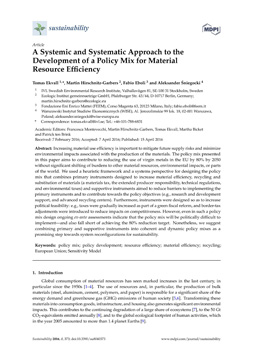
A Systemic and Systemativ Approach to the Development of a Policy Mix for Material Resource Efficiency
Increasing material use efficiency is important to mitigate future supply risks and minimize environmental impacts associated with the production of materials. The policy mix presented in this paper aims to contribute to reducing the use of virgin metals in the EU by 80% by 2050 without significantly shifting burdens to other material resources, the environmental or other parts of the world. The article, which was written with the collaboration of Dr. Martin Hirschnitz-Garbers (Senior Fellow at Ecologic Institute), is available for download.
We used a heuristic framework and a systems perspective for designing the policy mix that combines primary instruments designed to increase material efficiency, recycling and substitution of materials (a materials tax, the extended producer responsibility, technical regulations, and environmental taxes) and supportive instruments aimed to reduce barriers to implementing the primary instruments and to contribute towards the policy objectives (e.g., research and development support, and advanced recycling centers). Furthermore, instruments were designed so as to increase political feasibility: e.g., taxes were gradually increased as part of a green fiscal reform, and border-tax adjustments were introduced to reduce impacts on competitiveness. However, even in such a policy mix design ongoing ex-ante assessments indicate that the policy mix will be politically difficult to implement—and also fall short of achieving the 80% reduction target. Nonetheless, we suggest combining primary and supportive instruments into coherent and dynamic policy mixes as a promising step towards system reconfigurations for sustainability.






